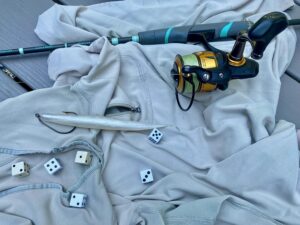Knowing a backshore beach’s structures — the deeps, shallows, and river-like troughs between the shore and the first sandbar — is as important to catching fish as knowing the tides, the wind, and the kind and quantity of bait to use.
In my mind as I set out from Newcomb Hollow Beach on my annual low-tide pilgrimage to study its cuts and basins was the idea that this was strictly a data-gathering expedition. But I had no intention of breaking Cape Cod’s holiest of beach-fishing canons: travel without a fishing rod at your peril. No matter how smart or lucky you are, you can’t catch a fish on the beach without your rod.
Almost a mile down the shore I approached a deep hole, the outlet of a river-like trough emptying over a long bar just off the beach. Small flapping silversides littered the beach along the tide line. Closer to the mouth of the current, I could see schools of tinker mackerel driving the frenzied baitfish ashore. The arrangement of sand and sea was ideal and promised to be a prolific fishing spot for months to come.
This being a reconnaissance mission, I had no urge to try a cast. Until I saw the telltale splash of a much bigger fish at the edge of the bar. A quick flick of my white paddletail lure was all it took to hook up to a decent-size bass. The longer I fished, the larger the bass seemed to get as they poured over the bar and into the swift current. This energetic display of tinkers chasing silversides and bass assaulting tinkers kept me enthralled for a good 45 minutes.

On my return to Newcomb Hollow, I thought about how fortunate I had been to find fish on this summer’s first trip to the back shore. I wondered, was my success thanks to skill or sheer luck?
That very morning I’d been casting next to Joe and two other fishing pals off Great Island, where big fish were greedily hitting our nine-inch silicon slug lures. Everyone except Joe was catching nice-size bass. He is a very competent fisherman and had dozens of strikes to his credit, but he hadn’t succeeded in hooking a single fish. “I’m cursed!” he shouted after each lost fish.
When I left, I felt a tad ashamed for outfishing Joe for no apparent reason. Was he doing something wrong? Was it simple bad luck? A statistical anomaly? I pondered the odds of the latter possibility and instantly regretted having called out, “Good luck!” I knew my words would neither change his fortune nor assuage his despair.
Luck seems to be the quality most people associate with fishing, as if fortune, rather than skill, knowledge, and perseverance were the defining element for success. It’s irksome to walk off the beach with a fat fish in hand — one you’ve landed in heavy surf after chasing it halfway to the next beach — and hearing someone shout, “Wow, weren’t you a lucky fisherman today!”
Luck, good or bad, is tinged with otherworldly significance. Hidden beneath the banality of the term lurks a cosmic, even religious undertone, a leftover in our DNA, perhaps, from the time humans believed spirits, ghosts, saints, witches, and divinities determined our fates. It is difficult to shake the belief that luck is a commodity meted out by a higher power and determined principally by our good deeds or sins.
This compulsion to believe in luck is not the preserve of fishermen alone. More than half of major league pitchers, for example, superstitiously avoid stepping on the foul line as they walk between the dugout and the mound. Here are people at the pinnacle of success, making millions of dollars, athletes who have been winners since Little League, who can’t let luck go.
I admit to having my lucky shirt (always the last one worn while catching fish) and my favorite go-to lure when the fishing is slow (this spring, the big white silicon lure has risen to mystical status). I strongly believe that when the fishing is slow and I’m ready to leave, making 10 more casts is the best way to entice my quarry to show up. A good hit, of course, buys another 10 casts. I can’t tell you how many hits and hookups I’ve had on the very last cast. My pals and I have had serious discussions about this phenomenon and the consensus is that it works best when you announce out loud, “This will be my last cast!”
When I was five or six, my grandparents bought me some wooden fish with steel eyes that floated in the bathtub. I spent hours tossing my magnetic “hook” to catch them, staying in the tub long after the water had cooled. At first, my success was random. But soon enough I learned how to hook the pretty play fish by aiming the magnet at the head rather than simply dragging my line through the water. In my imagination, these fish were not wooden but alive and infinitely challenging. I am still unable to look at any pool, river, or pond without imagining it full of colorful fish, which, with a bit of luck and a lot of skill, are mine to catch.



